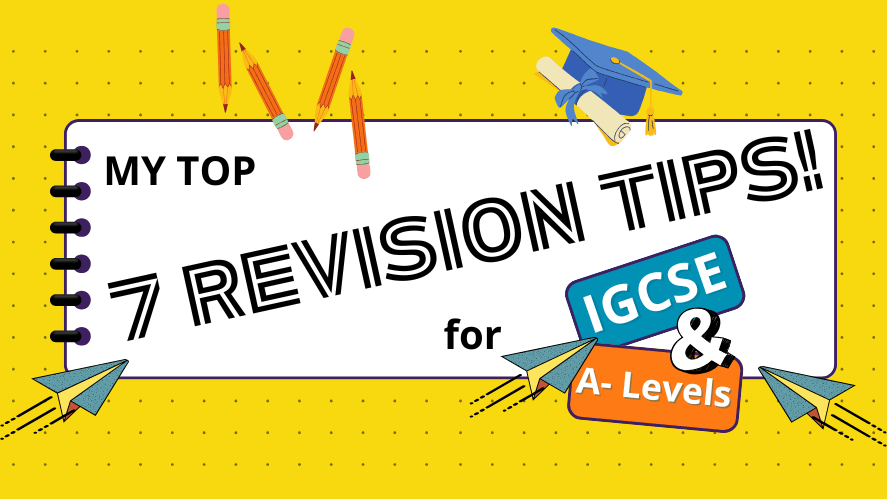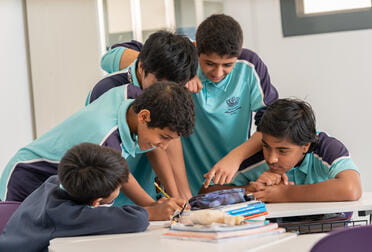💯 My Best Revision Tips for IGCSE & A-Level Exams (From Someone Who’s Been There)
If you’re reading this, you’re probably in full-on revision mode (or panicking that you should be 😅). Trust me, I’ve been there — exams like IGCSEs and A-Levels can feel overwhelming. But once I figured out a system that worked for me, things got much better to manage. Here are the revision tips that actually helped me stay sane and improve my grades — no fluff, just what worked.
1. 🎯 Set Goals That Don’t Feel Like a Joke
I used to write stuff like “Revise Physics” in my planner and wonder why I never felt productive. Turns out, vague goals don’t work. What helped was breaking topics down — like “Revise Newton’s Laws and do 3 past paper questions.”
It’s way easier to tick things off, and ticking = dopamine = motivation ✅
2. 🗓️ Make a Revision Timetable You Can Stick To
I won’t lie — I made at least three timetables before I found one that actually worked. My final version was realistic (not 10 hours of study a day) and flexible. I built in breaks, left evenings lighter, and mixed subjects so I didn’t fry my brain.
I used Google Calendar + sticky notes on my wall. If I missed a session? No guilt — I just rescheduled and kept moving.
(This is also helpful when you start in university!)
3. 🧠 Active Recall & Spaced Repetition = Game-Changers
If there’s one thing I wish I started earlier, it’s active recall. Instead of just re-reading notes (which honestly feels productive but isn’t), I’d quiz myself with flashcards, blur my notes and try to rewrite them, or teach the topic out loud.
For science and vocab-heavy subjects, spaced repetition using Anki made a huge difference — I stopped forgetting things I learned weeks ago.
4. 📄 Past Papers Taught Me More Than My Textbooks
Seriously — do as many past papers as you can. Early on, I’d just read them, but closer to exams, I timed myself and wrote full answers. Then I’d mark them using the official mark scheme and highlight where I lost marks.
Doing this made me spot patterns in questions and learn exactly how to phrase my answers to get full marks.
5. 💻 Use Online Resources (Don’t Just Rely on Your Teacher)
Sometimes teachers explain things in a way that just doesn’t click — and that’s okay. I turned to YouTube (shoutout to Primrose Kitten, Science with Hazel, and Physics & Maths Tutor) and sites like Save My Exams or Seneca Learning.
I found watching videos right after reading a topic helped reinforce the info, especially for things like biology processes or tricky physics concepts.
6. 🤝 Study Groups Help (As Long as They Don’t Turn Into Gossip Hours)
I had a small group chat with two friends, and we’d quiz each other or explain topics we were stuck on. Honestly, teaching someone else is the best way to learn — if you can explain it clearly, you actually get it.
That said, don’t join massive group chats where it’s just memes and stress posts. You’ll waste more time than you save.
7. 🧘♀️ Don’t Burn Out — Your Brain Isn’t a Machine
During mocks, I used to study until midnight, thinking more hours = better grades. Spoiler: I burned out and forgot half of what I studied. After that, I made sleep and breaks a priority.
What helped me:
- Pomodoro method (25 mins study, 5 mins break)
- Short walks/ exercise when I felt brain-dead
- Leaving one day a week mostly free (Tuesday = reset day)
Trust me, you’ll revise better when you’re rested.
📌 Final Thoughts: Progress Over Perfection
Some days you’ll smash your goals. Some days you’ll barely get through a topic. That’s normal. What matters most is showing up consistently, forgiving yourself when it doesn’t go to plan, and trusting the process.
🧠 Quick FAQs
How many hours a day should I revise?
I did around 4–6 hours on weekends and 2–3 hours after school. Find your rhythm — quality > quantity.
What helped you most with sciences?
Diagrams, past paper questions, and teaching topics out loud (even to my cat lol).
Did you revise differently for IGCSE vs A-Levels?
Yes! A-Levels go deeper, so I spent more time understanding concepts and linking topics. IGCSEs were more about memorizing key facts and applying them correctly.
💬 Last Tip: Don’t Compare Yourself to Others
Someone will always say “I haven’t revised at all” and then somehow get an A*. Don’t let that distract you. Focus on your own path. You’ve got this.
📥 Save this for later, or send it to a friend who's stressing. You’re not alone.





.png?h=499&iar=0&w=706&rev=63165a8810244449860f5414c2ca7f3e&hash=66868911C54B957AEE56699A1894600C)

.png?h=499&iar=0&w=887&rev=fbbb0ca901a74140ac21f4d9273fee72&hash=9812355A210F058AA584AA4193B58A41)
